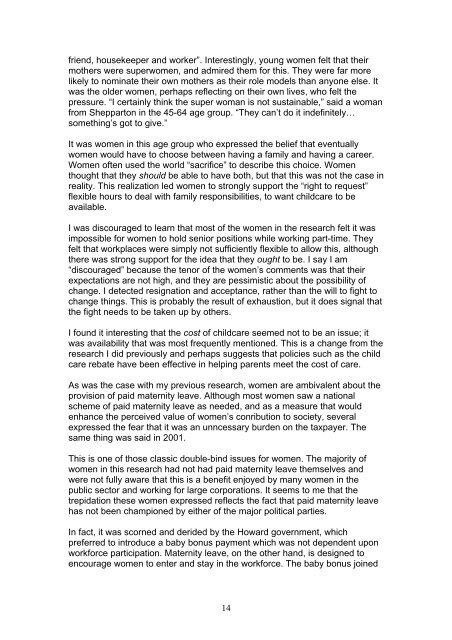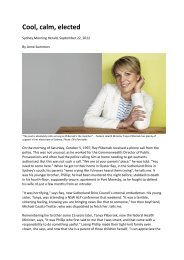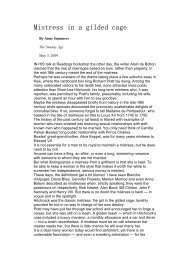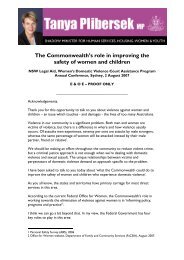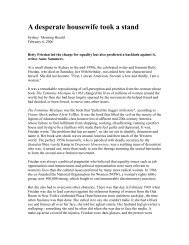Putting Equality Back on the Agenda - The Looking Glass
Putting Equality Back on the Agenda - The Looking Glass
Putting Equality Back on the Agenda - The Looking Glass
You also want an ePaper? Increase the reach of your titles
YUMPU automatically turns print PDFs into web optimized ePapers that Google loves.
friend, housekeeper and worker”. Interestingly, young women felt that <strong>the</strong>ir<br />
mo<strong>the</strong>rs were superwomen, and admired <strong>the</strong>m for this. <strong>The</strong>y were far more<br />
likely to nominate <strong>the</strong>ir own mo<strong>the</strong>rs as <strong>the</strong>ir role models than any<strong>on</strong>e else. It<br />
was <strong>the</strong> older women, perhaps reflecting <strong>on</strong> <strong>the</strong>ir own lives, who felt <strong>the</strong><br />
pressure. “I certainly think <strong>the</strong> super woman is not sustainable,” said a woman<br />
from Sheppart<strong>on</strong> in <strong>the</strong> 45-64 age group. “<strong>The</strong>y can’t do it indefinitely…<br />
something’s got to give.”<br />
It was women in this age group who expressed <strong>the</strong> belief that eventually<br />
women would have to choose between having a family and having a career.<br />
Women often used <strong>the</strong> world “sacrifice” to describe this choice. Women<br />
thought that <strong>the</strong>y should be able to have both, but that this was not <strong>the</strong> case in<br />
reality. This realizati<strong>on</strong> led women to str<strong>on</strong>gly support <strong>the</strong> “right to request”<br />
flexible hours to deal with family resp<strong>on</strong>sibilities, to want childcare to be<br />
available.<br />
I was discouraged to learn that most of <strong>the</strong> women in <strong>the</strong> research felt it was<br />
impossible for women to hold senior positi<strong>on</strong>s while working part-time. <strong>The</strong>y<br />
felt that workplaces were simply not sufficiently flexible to allow this, although<br />
<strong>the</strong>re was str<strong>on</strong>g support for <strong>the</strong> idea that <strong>the</strong>y ought to be. I say I am<br />
“discouraged” because <strong>the</strong> tenor of <strong>the</strong> women’s comments was that <strong>the</strong>ir<br />
expectati<strong>on</strong>s are not high, and <strong>the</strong>y are pessimistic about <strong>the</strong> possibility of<br />
change. I detected resignati<strong>on</strong> and acceptance, ra<strong>the</strong>r than <strong>the</strong> will to fight to<br />
change things. This is probably <strong>the</strong> result of exhausti<strong>on</strong>, but it does signal that<br />
<strong>the</strong> fight needs to be taken up by o<strong>the</strong>rs.<br />
I found it interesting that <strong>the</strong> cost of childcare seemed not to be an issue; it<br />
was availability that was most frequently menti<strong>on</strong>ed. This is a change from <strong>the</strong><br />
research I did previously and perhaps suggests that policies such as <strong>the</strong> child<br />
care rebate have been effective in helping parents meet <strong>the</strong> cost of care.<br />
As was <strong>the</strong> case with my previous research, women are ambivalent about <strong>the</strong><br />
provisi<strong>on</strong> of paid maternity leave. Although most women saw a nati<strong>on</strong>al<br />
scheme of paid maternity leave as needed, and as a measure that would<br />
enhance <strong>the</strong> perceived value of women’s c<strong>on</strong>ributi<strong>on</strong> to society, several<br />
expressed <strong>the</strong> fear that it was an unncessary burden <strong>on</strong> <strong>the</strong> taxpayer. <strong>The</strong><br />
same thing was said in 2001.<br />
This is <strong>on</strong>e of those classic double-bind issues for women. <strong>The</strong> majority of<br />
women in this research had not had paid maternity leave <strong>the</strong>mselves and<br />
were not fully aware that this is a benefit enjoyed by many women in <strong>the</strong><br />
public sector and working for large corporati<strong>on</strong>s. It seems to me that <strong>the</strong><br />
trepidati<strong>on</strong> <strong>the</strong>se women expressed reflects <strong>the</strong> fact that paid maternity leave<br />
has not been champi<strong>on</strong>ed by ei<strong>the</strong>r of <strong>the</strong> major political parties.<br />
In fact, it was scorned and derided by <strong>the</strong> Howard government, which<br />
preferred to introduce a baby b<strong>on</strong>us payment which was not dependent up<strong>on</strong><br />
workforce participati<strong>on</strong>. Maternity leave, <strong>on</strong> <strong>the</strong> o<strong>the</strong>r hand, is designed to<br />
encourage women to enter and stay in <strong>the</strong> workforce. <strong>The</strong> baby b<strong>on</strong>us joined<br />
14


